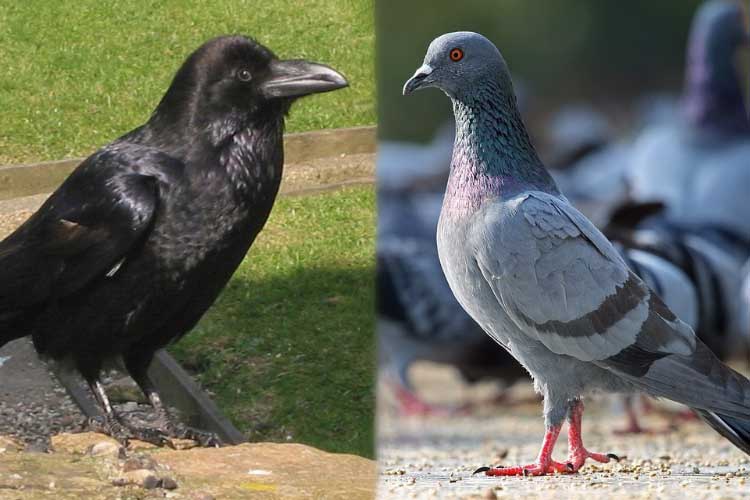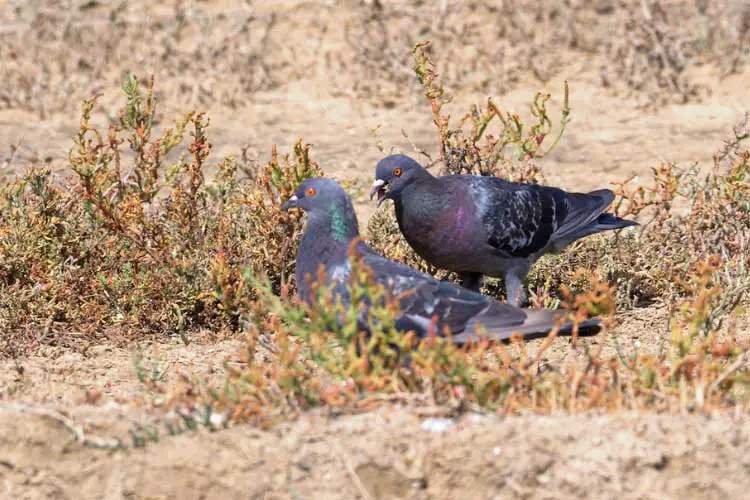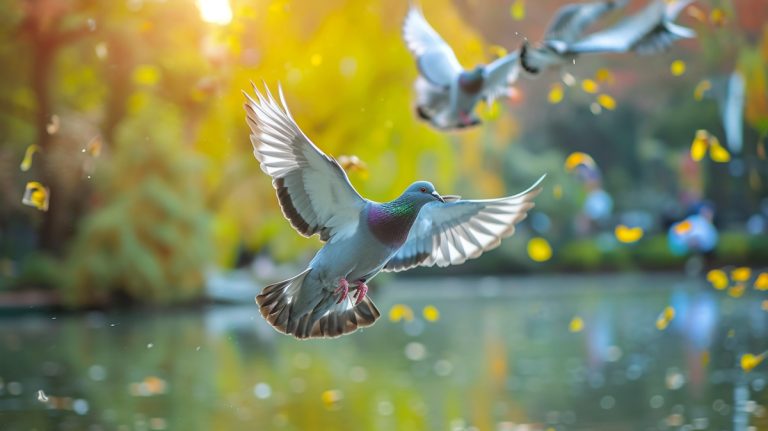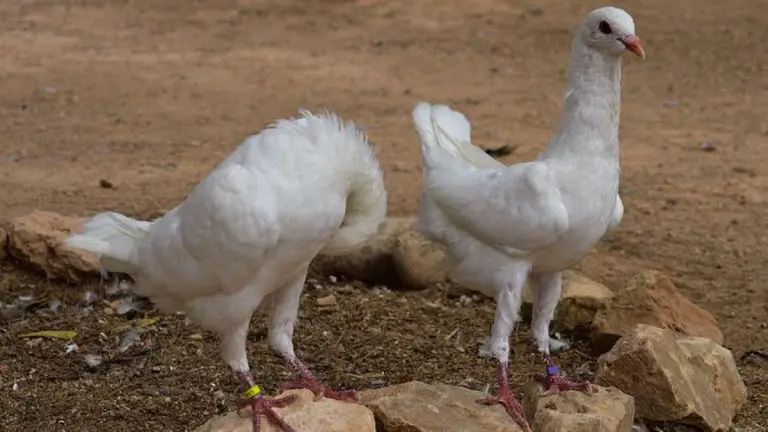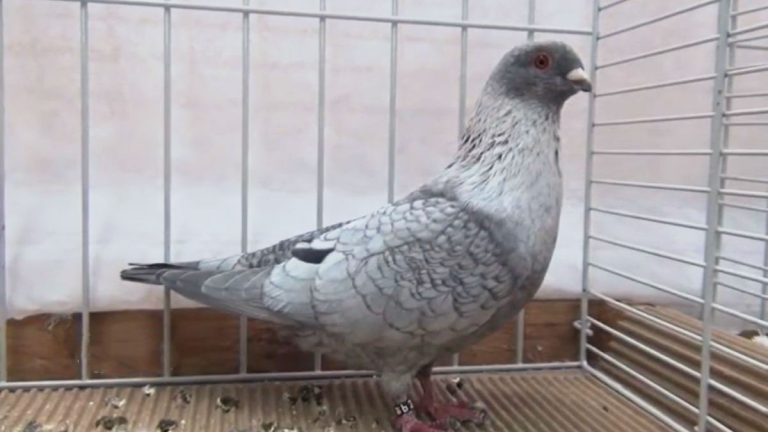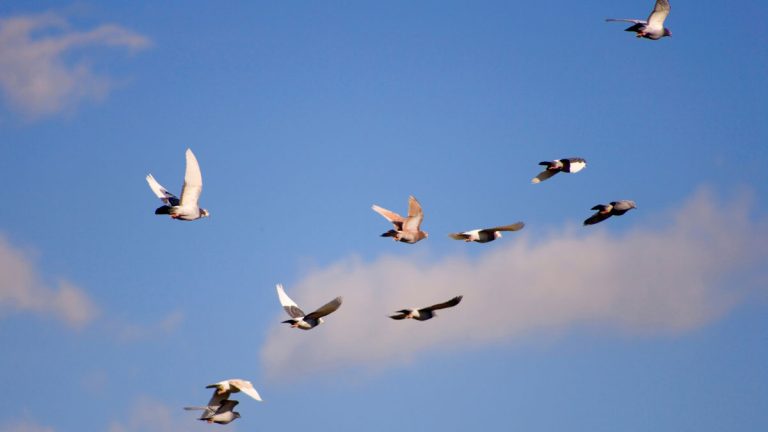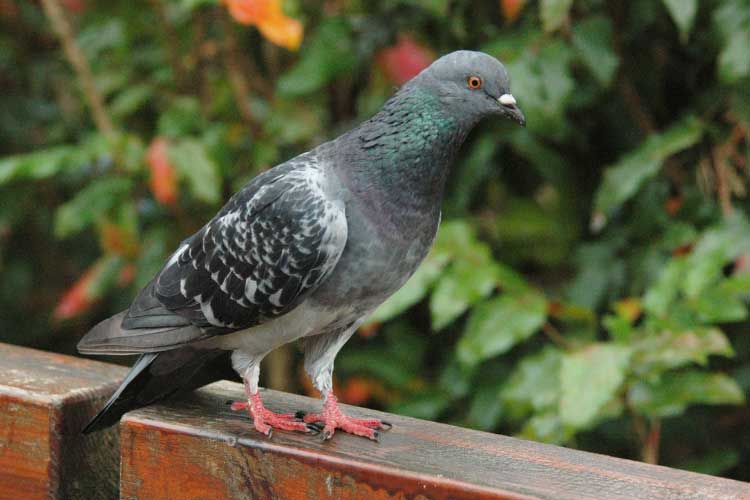Crow vs Pigeon: Who Would Win a Fight? Will Crows Eat Them?
Crows and pigeons are two birds that are often seen in urban environments. The two might often clash for various reasons.
So, crow vs pigeon: who would win a fight? Will crows eat them? Crows are larger and stronger birds with sharp beaks and talons. They are also brilliant and have good problem-solving skills. Pigeons, on the other hand, are smaller and weaker birds. In a fight, a crow would come out victorious against a pigeon. As for the question of crows eating pigeons, it is possible but not a common occurrence.
This article will provide a comprehensive look at the relationship between crows and pigeons, answering questions. So, keep reading to discover the truth behind the crow vs. pigeon debate.
Crow vs Pigeon: Who Would Win a Fight? Will Crows Eat Them?
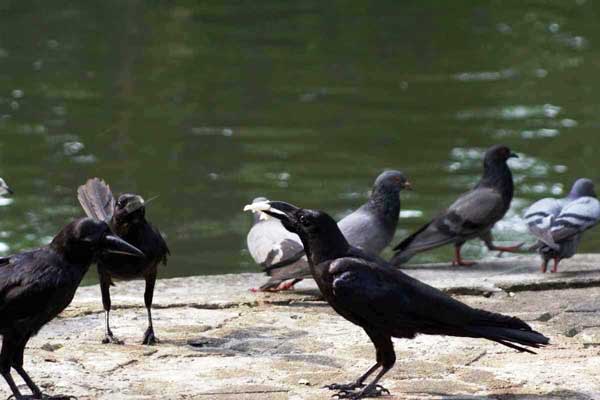
If a crow fights a pigeon, hypothetically, the crow would win. Here is why:
1. Physical Size
Crows are generally more giant and have a more muscular build than pigeons, which gives them an advantage in a physical fight.
2. Talons and Beak
These predators possess sharp talons and strong beaks, which can be used as weapons in a fight. Pigeons, on the other hand, have less developed claws and beaks. Watch this video of crow and pigeon fighting.
3. Intelligence
Crows are known to be brilliant birds with good problem-solving skills. This intelligence allows them to strategize and outmaneuver their opponent in a fight. This means that crows can think ahead and have a plan of action, while pigeons may not.
4. Flight
Crows are more agile and have excellent flight capabilities than pigeons, allowing them to escape or attack more easily. They can move faster and change direction more quickly, which can be a significant advantage in a fight.
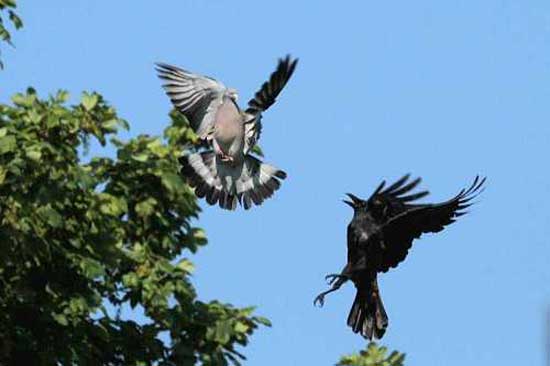
5. Natural Behaviors
Crows are known to be more aggressive and territorial birds than pigeons, and they may be more likely to initiate a fight. Crows may be more likely to start a battle to protect their territory or young.
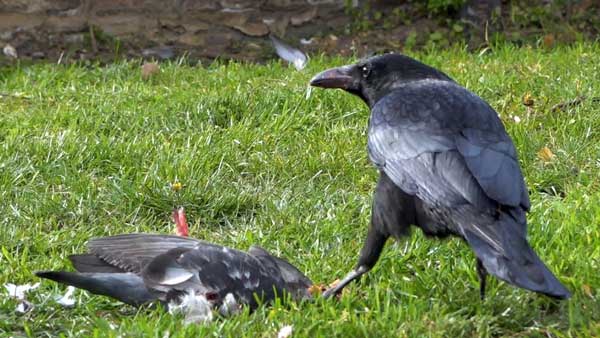
6. Group Behavior
These predators often travel and hunt in groups, providing them with a tactical advantage in a fight against a lone pigeon. They can work together to attack or defend, while a pigeon must face them alone.
7. Experience
Crows may have experience hunting similar birds or animals with similar characteristics to pigeons. They may have experience hunting birds similar to pigeons. Hence, they can apply that experience in a fight.
8. Protective Instinct
These birds also have a strong protective instinct for their young and territory. This may make them more likely to defend themselves and attack a perceived threat like a pigeon. Crows may be more likely to fight if they feel their young or territory is in danger.
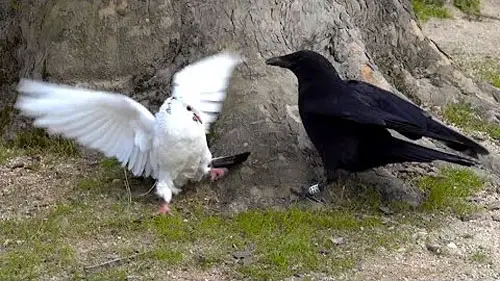
9. Adaptability
Crows are known for their adaptability and resilience, which allows them to adapt and survive in a wide range of environments. This adaptability may also give them an advantage in a fight, as they can quickly adapt to the pigeon’s fighting style and counter it.
Now the question of whether crows would eat pigeons is valid, as crows are known to be opportunistic feeders with a varied diet. However, it is not a common occurrence for crows to eat pigeons.
Factors that Influence a Crow’s Decision to Feed on a Pigeon
The decision of a crow to feed on a pigeon is a complex one that is influenced by a variety of factors:
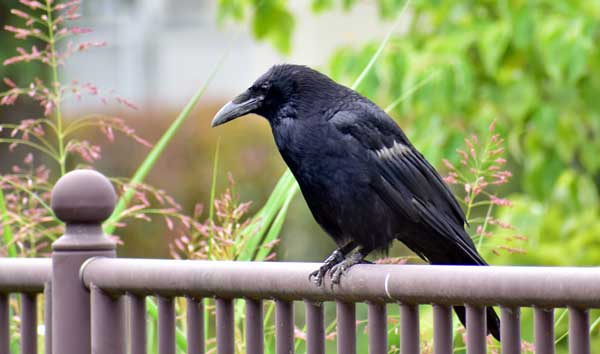
1. Prey Preference
Crows, like many animals, prefer certain types of food. They have been observed to preferentially consume certain types of food, such as peanuts or suet, over others. Pigeons, being smaller and weaker than crows, may not be as desirable or nutritious a food source as crows have access to other options.
2. Social Behavior
These birds also hunt and forage in groups and have been observed working together to flush out and capture prey.
On the other hand, Pigeons are typically found in smaller flocks, and a group of crows may not see them as a worthwhile target. If the hunting group is smaller, they might see them as a valuable target and decide to devour them.
3. Territorial Instinct
Crows have a strong territorial instinct and may be likely to hunt pigeons in an area where they have established a territory. They may see pigeons as a threat to their domain and choose to pursue them.
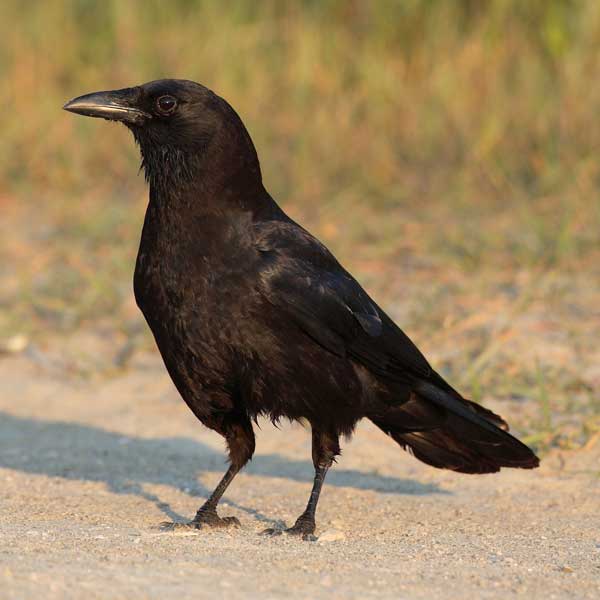
Accordingly, if pigeons have a territory near crows, they might not be hunted. They are not a threat to them as they have been cohabiting. Also, crows have a good memory. If they have been used to staying near pigeons, they won’t hunt them.
4. Availability of Food
Crows may not see the need to hunt pigeons if other food sources are readily available. In cases of famine, their last resort would be chasing pigeons.
5. Historical Data
Historical data and observations of crows hunting and eating pigeons can also inform our understanding of this behavior today. For example, if crows in a particular area have been observed hunting and eating pigeons in the past, it is more likely that they will continue to do so in the future.
How to Protect your Pigeons from Crows?
Pigeons do not stand a chance against crows. So, protect them from this predator in the following ways:
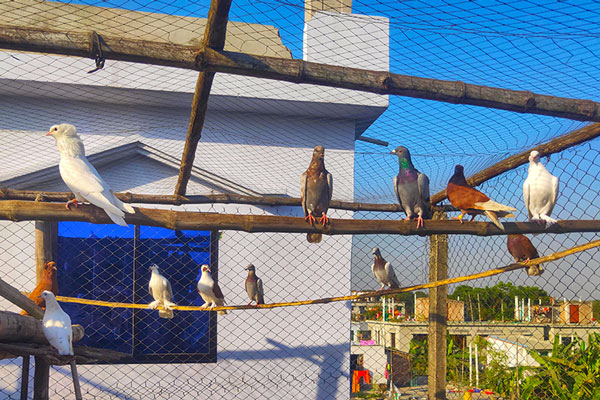
1. Provide a Secure Coop or Loft
Pigeons need a secure place to roost, such as a coop or loft protected from predators. This includes having a solid roof, walls, and a locking door to keep crows out. The cage or loft should be made of sturdy materials that can withstand the elements and be difficult for predators to break into.
2. Use a Decoy
Placing a decoy, such as a plastic owl or hawk, in the vicinity of your pigeons can help deter crows from approaching. Crows are known to be intimidated by predators, and a decoy can create the illusion of a predator in the area.
The decoy should be placed in a visible location near the coop or loft to have maximum effect.
3. Use Netting
Covering your pigeons’ coop or loft with a fine mesh netting can also help to keep crows out. Ensure that the net is securely attached and has a small mesh size to prevent crows from getting through.

Likewise, ensure the netting covers the coop or loft’s perimeter and top side. It should be stretched tight to prevent any openings or gaps.
4. Keep Feed and Water Away
Keep your pigeons’ feed and water away from the coop or loft to prevent crows from being attracted to the area. Crows are known to be attracted to food sources, and keeping your pigeons’ feed and water away can help to keep them away.
However, don’t forget to keep the area around your pigeons’ coop or loft clean of food scraps and waste.
5. Use Noise Deterrents
Crows are sensitive to noise, so using noise deterrents such as loudspeakers or alarms can help to keep them away.
These noise deterrents can create an unpleasant environment for crows, making them less likely to approach your pigeons. The noise deterrents should be placed near the coop or loft and regularly activated throughout the day.
6. Train Your Pigeons
Some pigeon breeds are more aggressive and territorial than others, so training them to be more assertive may help to protect them from crows.
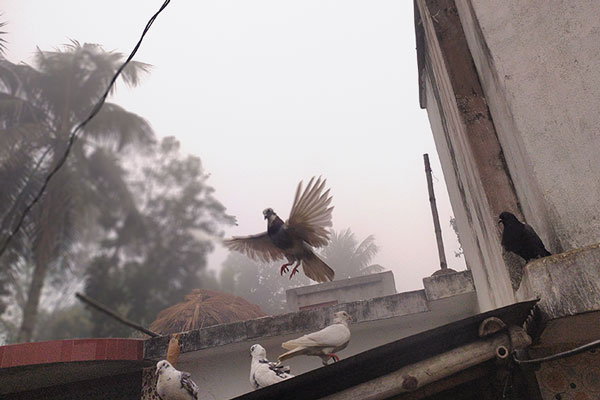
This can be achieved by training them with various stimuli to be more vocal and active. You could use a decoy crow to act as the stimuli. By training your pigeons to be more aggressive and territorial, they may be more likely to defend themselves if a crow approaches.
If you’re interested in learning more about pigeon intelligence and behavior, you might find our articles on are pigeons smart or dumb and how to scare away pigeons but not other birds helpful. Our article on are pigeons smart or dumb sheds light on the cognitive abilities of pigeons, while our article on how to scare away pigeons but not other birds provides practical tips and advice for keeping pigeons away without harming other bird species. Check them out to deepen your understanding of pigeon intelligence and behavior.FAQs
Here are answers to common questions about the topic:
No. Crows are generally not known to attack humans, but they may defend themselves or their young if they feel threatened. They may also become accustomed to human presence and may not be as afraid of people as they would be otherwise.
No. In the United States, crows are protected by the Migratory Bird Treaty Act (MBTA), and it is illegal to kill or harm them without a permit. The MBTA is a federal law enacted in 1918, and it protects over 800 species of migratory birds, including crows.
The law makes it illegal to kill, capture, or sell migratory birds, their nests, eggs, or parts.
Conclusion
So now you know the answers to crows vs pigeon: who would win a fight? Will crows eat them? Hence, you should not leave your pigeons to fight crows on their own, as they will be outdone, killed, and possibly eaten.
Instead, take preventive measures mentioned in this write-up to deter crows. You should not use chemicals or other weapons that could harm crows. These birds are protected, and you might be jailed for wounding one.
